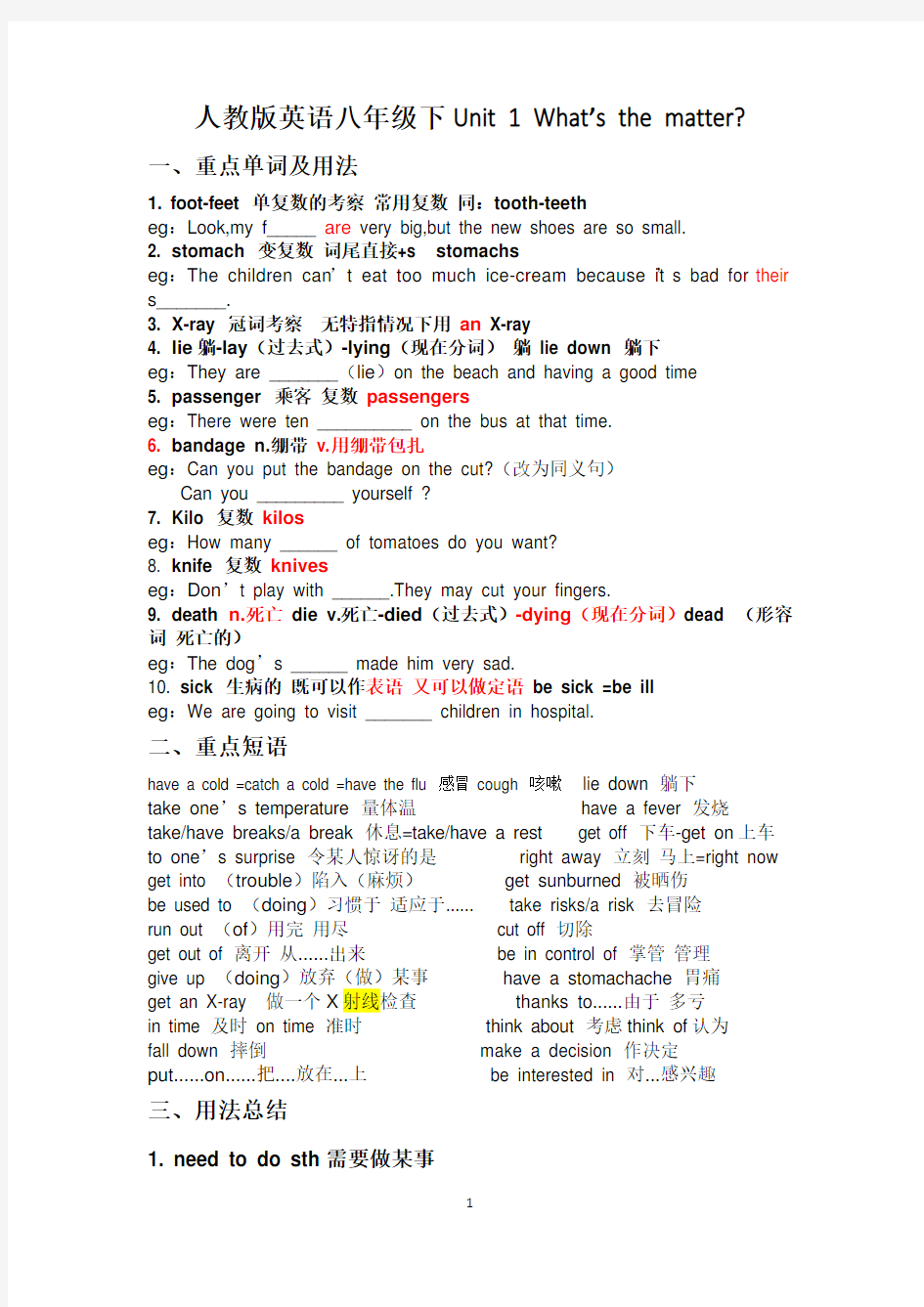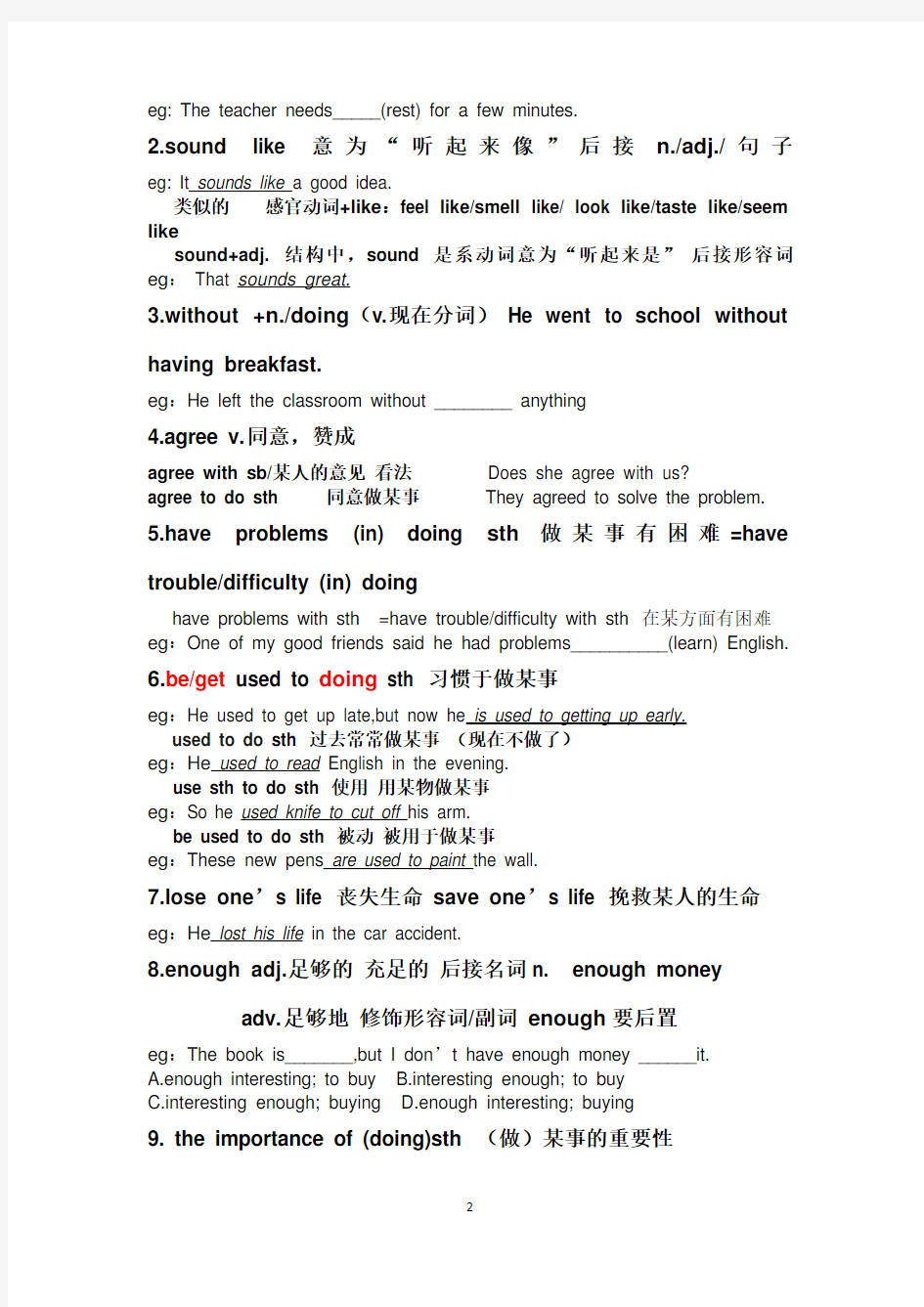

人教版英语八年级下Unit 1 What’s the matter?
一、重点单词及用法
1. foot-feet 单复数的考察常用复数同:tooth-teeth
eg:Look,my f_____ are very big,but the new shoes are so small.
2. stomach 变复数词尾直接+s stomachs
eg:The children can’t eat too much ice-cream because it’s bad for their s_______.
3. X-ray 冠词考察无特指情况下用an X-ray
4. lie躺-lay(过去式)-lying(现在分词)躺lie down 躺下
eg:They are _______(lie)on the beach and having a good time
5. passenger 乘客复数passengers
eg:There were ten __________ on the bus at that time.
6. bandage n.绷带v.用绷带包扎
eg:Can you put the bandage on the cut?(改为同义句)
Can you _________ yourself ?
7. Kilo 复数kilos
eg:How many ______ of tomatoes do you want?
8. knife 复数knives
eg:Don’t play with ______.They may cut your fingers.
9. death n.死亡die v.死亡-died(过去式)-dying(现在分词)dead (形容词死亡的)
eg:The dog’s ______ made him very sad.
10. sick 生病的既可以作表语又可以做定语be sick =be ill
eg:We are going to visit _______ children in hospital.
二、重点短语
have a cold =catch a cold =have the flu 感冒cough 咳嗽lie down 躺下
take one’s temperature 量体温have a fever 发烧
take/have breaks/a break 休息=take/have a rest get off 下车-get on上车
to one’s surprise 令某人惊讶的是right away 立刻马上=right now get into (trouble)陷入(麻烦)get sunburned 被晒伤
be used to (doing)习惯于适应于...... take risks/a risk 去冒险
run out (of)用完用尽cut off 切除
get out of 离开从......出来be in control of 掌管管理
give up (doing)放弃(做)某事have a stomachache 胃痛
get an X-ray 做一个X射线检查thanks to......由于多亏
in time 及时on time 准时think about 考虑think of认为
fall down 摔倒make a decision 作决定put......on......把....放在...上be interested in 对...感兴趣
三、用法总结
1. need to do sth需要做某事
eg: The teacher needs_____(rest) for a few minutes.
2.sound like 意为“听起来像”后接n./adj./句子eg: It sounds like a good idea.
类似的感官动词+like:feel like/smell like/ look like/taste like/seem like
sound+adj. 结构中,sound 是系动词意为“听起来是”后接形容词eg:That sounds great.
3.without +n./doing(v.现在分词)He went to school without having breakfast.
eg:He left the classroom without ________ anything
4.agree v.同意,赞成
agree with sb/某人的意见看法Does she agree with us?
agree to do sth 同意做某事They agreed to solve the problem. 5.have problems (in) doing sth做某事有困难=have trouble/difficulty (in) doing
have problems with sth =have trouble/difficulty with sth 在某方面有困难eg:One of my good friends said he had problems__________(learn) English.
6.be/get used to doing sth 习惯于做某事
eg:He used to get up late,but now he is used to getting up early.
used to do sth 过去常常做某事(现在不做了)
eg:He used to read English in the evening.
use sth to do sth 使用用某物做某事
eg:So he used knife to cut off his arm.
be used to do sth 被动被用于做某事
eg:These new pens are used to paint the wall.
7.lose one’s life 丧失生命save one’s life 挽救某人的生命eg:He lost his life in the car accident.
8.enough adj.足够的充足的后接名词n. enough money
adv.足够地修饰形容词/副词enough要后置
eg:The book is_______,but I don’t have enough money ______it.
A.enough interesting; to buy
B.interesting enough; to buy
C.interesting enough; buying
D.enough interesting; buying
9. the importance of (doing)sth (做)某事的重要性
important adj.重要的unimportant adj.不重要的importance n.重要性eg:We students should know the importance of (learning)English.
10.decision n.决定make a decision (to do sth)
decide to do sth 决定做某事decide not to do sth 决定不做某事
eg:Tom made a decision to study English well.
11.give up 放弃
give up 是动词+副词结构接代词作宾语时代词放中间
eg:The problem is so difficult for you,but don’t _______
A. give it up
B.give it out
C.give up it
D.give out it
give up doing sth 放弃做某事
eg:You will be very sad if you give up______(sing).
12.keep 用法
keep on doing sth 继续做某事(中间有间隔强调重复性)
eg:He kept on studying though he was very tired.
keep doing sth 继续不停地做某事(不间断连续性)
eg:Keep walking until you reach the end of the road.
keep sb doing 让某人一直做某事
eg:Don’t keep the other students waiting.
keep sb from doing sth 阻止某人做某事
eg:We should keep the little boy from stepping on the grass.
13.find 用法
find找到,强调寻找的结果look for强调寻找过程find out找出查明eg:I was looking for my watch,but I didn’t find it.
find sb doing sth 发现某人正在做某事
eg:When I walked along the road,I found an old man shouting for help.
find it +adj形容词+to do sth 发现做某事是...的
eg:She found it hard to finish the work by herself.
14.take risks=take a risk 冒险He likes taking risks.
risk one’s life to do 冒着生命危险去做某事
eg:He risked his life to save the child.
risk doing sth
eg: The man called T om often risks flying over the sea.
四、短语辨析
1. see sb doing sth 看见某人正在做某事(动作正在发生)
see sb do sth 看见某人做某事(看到动作全过程或者经常看到动作发生)eg:I saw the boy crying when I passed by(路过).
类似的hear/watch/notice/find+sb do/doing sth
thanks to 多亏... 由于....=with the help of/with one’s
help=because of
thanks for 因.......而感谢强调感谢的原因
eg:Thanks to my teacher ,I passed the exam.
Thanks for your help .Thanks for inviting me.
2. in time 及时表示动作在规定时间内或比规定时间提前发生
on time 准时按时指正好在规定时间内
eg:Thanks for coming here to help me in time.
The train arrived into the station on time.火车准时进站了。
3. think about 考虑think of 认为;想起
eg:I only thought about saving the boy without thinking about anything.
The picture makes me think of my grandfather.
What do you think of your English teacher?=How do you like your teacher?
4. too many ; too much; much too;
too many ;too much 修饰名词too many+可数名词;too much+不可数名词eg:too many people too much water/homework
much too 修饰adj.形容词
eg:Don’t eat _____junk food,or you will be ____fat.
A. much too;too much
B.too many;too many
C.too much;much too
D.too much;too many
5. interesting 有趣的一般修饰物interested 感兴趣的一般修饰人
习惯用法:get/become/be interested in sth/doing sth 对......感兴趣
eg:She became interested in singing songs.
The story is interesting and all of us are interested in it.
6. because 连词后接句子
because of 介词短语后接名词/动名词/代词
eg:I didn’t go out last night because of the heavy rain.
=I didn’t go out last night because it rained heavily.
7. so...that... 如此......以至于...... 引导结果状语从句
so that 以便,为了引导目的状语从句
eg:She is so young that she can’t dress herself.(结果)
The teacher spoke loudly so that everyone could hear him clearly.(目的)
so +adj/adv +that 从句= too+adj/adv+to do sth (太...而不能......)
She is too young to dress herself.
8. be in control of控制管理主动;反义词组-be out of control 无法管理
be in the control of 被控制管理在...的控制之下被动.
eg:A teacher must be in control of his class.
9. run out of 用完,用尽人作主语We have run out of our money.
run out用完,用尽物作主语主语一般为时间金钱Our time is running out.
10. sick 生病的,有病的可以作表语也可以做定语
ill 生病的,有病的只可以作表语比较级为worse 最高级为worst illness 名词生病
eg:She can’t go to school because she is ill/because of her illness.
Please take good care of the sick boy.
11. expect/wish/hope
expect 预计;期望,希望expect to do/expect sb to do sth/expect+that 从句
eg:He expects to win the prize.
wish 希望;祝愿可能性较小wish to do sth/wish sb to do sth/
eg:I wish to fly in the sky.
hope 可能性较大希望hope to do sth /hope +that 从句
(没有hope sb to do sth)
eg:I hope to see you soon.
12. get off 下车get on 上车多指从公交车火车飞机下来空间大的交通工
具
get out of 从...出来get in上去指上下小型交通工具汽车出租车
eg:Lucy is getting on the bus while I am getting off.
13. fall(fell) down 与fall off
fall down 意为“倒下”,在平面摔倒;fall off 意为“跌落”强调从某处掉了下来
联系fall down from(从......摔下)=fall off
eg:When the little girl ran across the street,she fell down
He fell off the bike and broke his legs.
四、语法大点
1. 询问对方哪里不舒服,或者遇到什么麻烦以及回答
问:What’s the matter(with you )?=What’s the troubl(with you)?= What’s wrong(with you)=What happened(to you)?
=What’s up (with you)?
答:I have a cold (感冒)=I get a cold =I catch a cold= I have the flu.
have a bad/terrible/heavy cold(重感冒)have a little cold(轻感冒)
I have a fever (发烧)I have a cough(咳嗽)
I have a stomachache/headache/toothache/backache(胃痛/头疼/牙疼/后背疼)
I have a sore throat/sore knee/sore feet (嗓子疼/膝盖疼/脚疼)
2.情态动词should 意为“应该”
课本原句:You shouldn’t eat so much next time.
He should lie down and rest.
He should a dentist and get an X-ray.
Should I put some medicine on it?
注意:should 没有人称和数的变化
它和其后的动词原形一起做谓语
句式变化:
肯定句:主语+should+动词原形+其他
eg:You should read his new book.
否定句:主语+should+not+动词原形+其他
eg:You shouldn’t eat anything.
一般疑问句式:Should+主语+动词原形+其他?
eg:Should I trust him?
特殊疑问句:特殊疑问词+should+主语+动词原形+其他?
eg:When should we go?
具体用法:
表示委婉地提出建议与意见
eg:You should take some medicine.
表示职责与义务
eg:As a student,you should work hard.
表示推测意为“应该可能”对现在或者未来的推测
eg:My brother should get there soon.He left home at 7:00.
3.反身代词
课本原文:But the driver didn’t think about himself
He hurt himself in P.E.class.
On April 26,2003,he found himself in a very dangerous situation when climbing in Utah.
含义:表示反射或者强调自己的代词叫反身代词,意为“自己,亲自”
常见搭配:
enjoy oneself=have fun=have a good time teach oneself=learn...by oneself
by oneself=alone 独自
help oneself to sth 请随便吃...
introduce oneself to 向...自我介绍
dress oneself 自己穿衣服
leave sb,by oneself 把某人单独留下speak to oneself 自言自语
lose oneself 迷失
注:反身代词必须与主语保持人称的一致